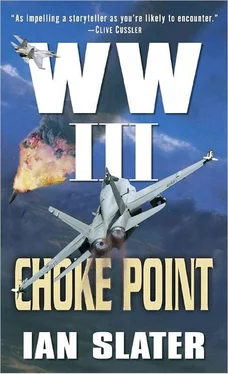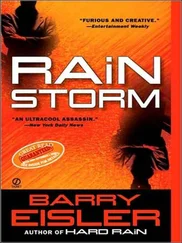“Keep an eye on them!” Frank told the mate as he quickly left the bridge and went through the helo hangar. He slid down the aft ladder to the stern deck without his feet touching a single step, the metal rails giving his hands a friction burn, his senses so alert that in addition to the salty tang of the sea and the peculiarly distinctive smell of fog-saturated air, he could detect the faint odor of the sonar recorder’s paper before he stepped over the lab’s doorsill.
Frank saw that the spots on the trace, when they were magnified, did look square-ish, but that was all.
It was a fifty-fifty situation. Neither of the technicians had said anything yet, unwilling to commit themselves one way or the other. “Suggestions?” he asked the two men. “Any at all?”
“I–I dunno,” said one. The other, teeth clenched, giving his jaw an unappealing, undershot look, shook his head. Frank had left the lab-bridge intercom open for immediate communication.
“What are they doing?” he asked the mate.
“Just circling.”
“Circling us ?” Frank asked in alarm.
“No, I mean just — you know, going around.”
“No, I don’t know — that’s why I asked you, you idiot. Be specific , dammit!”
There was an awkward silence.
“Bridge?” Frank said.
“Yes, sir?”
“I apologize. I was way out of line.”
“That’s all right, sir. I’ve tried to identify any name on the inflatable but can’t see anything.”
“Good man. Keep looking.”
“Yes, sir.”
“LOSHOK packs all ready to go,” the bosun announced from the lab door.
“Very well.” Frank’s arms were back in Horatio Nelson mode.
“What’d he say?” Tiny asked the bosun as he returned to the deck.
“He said, ’Very well.’ “
“ ’Very well?’ “
“Yeah, like he was Captain Queeg.”
“Who’s that?” asked the cook’s helper.
Tiny, tightening the rope length he’d used to replace his belt, grunted, “Queeg was an old man on a cruiser—”
“Destroyer,” the bosun corrected him.
“Whatever,” said Tiny.
“So what happened?” pressed the cook’s assistant.
“What happened is he went nuts. Under pressure. Caved in. Paranoid. Talked to himself.”
The cook’s helper looked disquieted. “I do that sometimes.”
“Yeah, well, you’re nuts too.”
“Bosun,” called Frank. “Lower our runaround. I’m going out to talk to these jokers. See what the score is.”
“I dunno, sir,” said the bosun uneasily. “If you don’t mind my sayin’ so, they’re—”
“What would you suggest?” asked Hall. “If they’re terrorists, they probably wouldn’t try this caper unless they had antitank ordnance. One round of that could easily split us open at the waterline. You know, well as I do, that we haven’t an inch of armor on Petrel . We’d sink in minutes. I’ve seen enough dead Americans. More dead bodies than when I was on tour.”
The tension increased when the two side-scan technicians reported that the roar of Petrel ’s engines being brought to full power to bluff the interlopers had scrambled the side-scan’s signals to the sea bottom and the return echoes. All they could see now was a massive earthquakelike trace, as if the stylus had lost its head.
“I’ll get back to you in ten minutes or so,” Hall told them, then ordered the bosun to have the crew lower Petrel ’s Zodiac inflatable.
Despite Frank’s somber mood, a mood that pervaded the entire vessel, Frank, calling the bosun by his first name, tried to inject a little morale-raising humor. “Jesus, Tommy,” he said, “I’ll be back for dinner!”
There was forced laughter from the crew, the cook’s helper the only one to think it was a contender for Petrel ’s “Best Joke of the Month.”
“You take care,” the bosun said.
Frank shoved off, the Zodiac’s outboard a little rough, spitting now and then as he headed straight for the other, bigger inflatable. Of course they wouldn’t be terrorists. Everyone was becoming too paranoid, as if America had been invaded. Looking back, as sailors always do, to the vessel from which he’d just departed, he saw the bosun standing alone on the hangar deck holding up a white rag, pointing downward.
Frank looked down and saw a white rag tucked into the space between the Zodiac’s gunwale and floor. It contained a suspiciously generic-looking .38 revolver.
A small, hastily scrawled note said, “Hollow points — remember, hold your breath and squeeze. Don’t pull.”
Frank didn’t know whether to be furious or grateful. He’d told these jokers, now only a hundred yards away, that he’d come unarmed. Squeeze. Don’t pull . Who the hell did Tommy think he was talking to? Some first-weeker at Coronado? He stuck the gun between his thigh and the Zodiac’s floor. The outboard was spitting again. Frank gave it a little more throttle. It choked and stopped, dead in the water. What had he learned at Coronado? “All outboards will fail precisely when they are most needed.”
Freeman had his nose in the air like a bloodhound. “Smell ’em?” he asked softly.
Aussie and Sal nodded, Choir’s sense of smell sabotaged by the exhaust of the Mercury engine and the bad air mix he’d been inhaling back on the beach. But for his SpecFor comrades, the faint yet distinctive odor of aftershave, cologne, and underarm deodorant told them someone was upwind of them in the fog-shrouded sea, probably no more than two or three hundred yards. The odors were the kind that had betrayed a younger generation of Americans in the jungles of Vietnam, making the same “give-away” mistake as David Brentwood had made by not ordering his team to eat only Arab food. Freeman now went to hand signals, his acute sense of smell indicating there must be at least four of them or maybe half a dozen, up ahead.
Then Choir detected the hushed slurr sound of another motor. He tapped Sal on the shoulder, Sal doing the same to Freeman, the general hoping that the invisible “perfume boys” somewhere up ahead had not yet detected them. Freeman made a throat-cutting gesture and Choir killed the engine, everyone silent, motionless, listening intently, the current taking them forward. Which way were the bogeys heading?
It was then that Petrel ’s Tiny saw it happen. The sky opened, the fog riven by sunlight, “Like bloody Moses!” said Tiny. Indeed, the sky suddenly seemed to expand, the common optical illusion at sea when land-generated thermals win the ever-shifting battle with the ocean’s air currents. The speed was such that just as during Freeman’s battle tour in Iraq, when an artillery round had collapsed a battalion’s row of showers to reveal a line of astonished naked bodies, his aluminum boat, Frank Hall’s Zodiac, and the sweet-smelling visitors circling near the Petrel in their RIB all suddenly saw one another and, a half mile to the east, the Coast Guard’s Skate .
For a frozen moment no one did anything, not even Freeman, who had experienced a similar unexpected standoff with a Republican Guard platoon when a dust storm had suddenly lifted near Hindiya. Then, he’d fired first; now, he hesitated, the nanosecond lost perhaps because of a fear of committing blue on blue. Friendly fire had caused more than half the coalition’s casualties in Iraq.
The 7.62mm burst from one of the six “fake Skate ” war party unzipped the deadlock, the rounds hitting the sea only three feet in front of Freeman, shocking the general and his team. Choir, making a crucially correct decision, steered at full speed toward the enemy inflatable’s bow. Only Freeman was firing, since there wasn’t enough room in the boat to permit either Aussie or Sal to shoot.
Читать дальше












